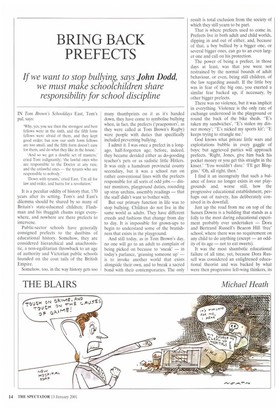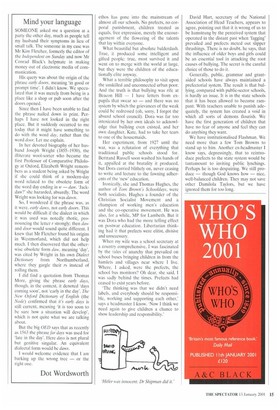BRING BACK PREFECTS
If we want to stop bullying, says John Dodd,
we must make schoolchildren share responsibility for school discipline
IN Tom Brown's Schooldays East, Tom's pal, says:
'Why, yes, you see then the strongest and best fellows were in the sixth, and the fifth form fellows were afraid of them, and they kept good order; but now our sixth form fellows are too small, and the fifth form doesn't care for them, and do what they like in the house.'
.And so we get a double set of masters,' cried Tom indignantly; 'the lawful ones who arc responsible to the Doctor at any rate, and the unlawful ones — the tyrants who are responsible to nobody.'
'Down with tyrants,' cried East, 'I'm all for law and order, and hurra for a revolution.'
It is a peculiar oddity of history that, 170 years after its setting, Tom's and East's dilemma should be shared by so many of Britain's state-educated children; Flashman and his thuggish chums reign everywhere, and nowhere are there prefects to intervene.
Public-sector schools have generally consigned prefects to the dustbins of educational history. Somehow, they are considered hierarchical and anachronistic, a non-egalitarian throwback to an age of authority and Victorian public schools founded on the coat tails of the British Empire.
Somehow, too, in the way history gets too many thumbprints on it as it's handed down, they have come to symbolise bullying when, in fact, the prefects ('praepostors', as they were called at Tom Brown's Rugby) were people with duties that specifically included preventing bullying.
I admit it. I was once a prefect in a longago, half-forgotten age; before, indeed, they became derided either as do-gooding teacher's pets or as sadistic little Hitlers. It was only a humdrum provincial county secondary, but it was a school run on rather conventional lines with the prefects responsible for all sorts of odd jobs — dinner monitors, playground duties, rounding up stray urchins, assembly readings — that the staff didn't want to bother with.
But our primary function in life was to stop bullying. Children do not live in the same world as adults. They have different creeds and fashions that change from day to day. It is impossible for grown-ups to begin to understand some of the brutishness that exists in the playground.
And still today, as in Tom Brown's day, no one will go to an adult to Complain of being picked on because to 'sneak' — in today's parlance, 'grassing someone up' — is to invoke another world that exists alongside their own, and to break a sacred bond with their contemporaries. The only result is total exclusion from the society of which they still yearn to be part.
That is where prefects used to come. in. Prefects live in both adult and child worlds, dipping in and out of either, and, because of that, a boy bullied by a bigger one, or several bigger ones, can go to an even larger one and call on his protection.
The power of being a prefect, in those days at least, was that you were not restrained by the normal bounds of adult behaviour, or even, being still children, of the law regarding assault. If the little boy was in fear of the big one, you exerted a similar fear backed up, if necessary, by other bigger prefects.
There was no violence, but it was implicit in everything. Violence is the only rate of exchange understood in the playground or round the back of the bike sheds. "E's taken my sandwiches', "E's stolen my dinner money'; "E's nicked my sports kit'; "E keeps trying to strangle me.'
God knows what private little wars and exploitations bubble in every gaggle of boys; but aggrieved parties will approach prefects. 'Right, Jones, give him back his pocket money or you get this straight in the kisser.' You wouldn't dare.' I'll get Bloggins."Oh, all right, then.'
I find it an incongruity that such a balance of force no longer exists in our playgrounds and, worse still, how the progressive educational establishment, perhaps out of naivety, has deliberately connived in its downfall.
Just up the road from me on top of the Sussex Downs is a building that stands as a folly to the most daring educational experiment probably ever undertaken — Dora and Bertrand Russell's Beacon Hill 'free' school, where there was no requirement on any child to do anything (except — an oddity of its age — not to eat sweets).
It was the most shambolic educational failure of all time, yet, because Dora Russell was considered an enlightened educational theorist and was backed by what were then progressive left-wing thinkers, its ethos has gone into the mainstream of almost all our schools. No prefects, no corporal punishment, children treated as equals, free expression, merely the encouragement of the flowering of the talents that lay within everyone.
What beautiful but absolute balderdash. True, it produced some intelligent and gifted people; true, most survived it and went on to merge with the world at large, but they were the children of the educationally elite anyway.
What a terrible philosophy to visit upon the unskilled and unconnected urban poor. And the truth is that bullying was rife at Beacon Hill — I have letters from expupils that swear so — and there was no system by which the grievances of the weak could be redressed (oh, sorry, I forgot the absurd school council). Dora was far too intoxicated by her own ideals to acknowledge that bullying even existed, and her own daughter, Kate, had to take her tears to one of the housemaids.
Her experiment, from 1927 until the war, was a refutation of everything that traditional public schools stood for. Bertrand Russell soon washed his hands of it, appalled at the brutality it produced, but Dora carried blithely on, never ceasing to write and lecture to the fawning adherents of the 'new' education.
Ironically, she and Thomas Hughes, the author of Tom Brown's Schooldays, were both socialists. Hughes a founder of the Christian Socialist Movement and a champion of working men's education and the co-operative movement. He was also, for a while, MP for Lambeth. But it was Dora who had the more telling effect on postwar education. Libertarian thinking had it that prefects were elitist, divisive and unnecessary.
When my wife was a school secretary at a country comprehensive, I was fascinated by the tales of anarchy that prevailed on school buses bringing children in from the hamlets and villages near where I live. Where, I asked, were the prefects, the school bus monitors? Oh dear, she said, I was sadly behind the times. Prefects had ceased to exist years before.
The thinking was that we didn't need labels, and everybody should be responsible, working and supporting each other.' says a headmaster I know. 'Now I think we need again to give children a chance to show leadership and responsibility.' David Hart, secretary of the National Association of Head Teachers, appears to agree, pointing out that it is wrong of us to be hamstrung by the perceived system that operated in the distant past when 'fagging' prevailed and prefects meted out slipper thrashings. There is no doubt, he says, that the influence of older boys and girls could be an essential tool in attacking the root causes of bullying. The secret is the careful choice of those to do it.
Generally, public, grammar and grantaided schools have always maintained a prefectorial system. The result is that bullying, compared with public-sector schools, is hardly an issue. It is in the state schools that it has been allowed to become rampant. With teachers unable to punish adequately, the system has created a void in which all sorts of demons flourish. We have the first generation of children that have no fear of anyone and feel they can do anything they want.
We have institutionalised Flashman. We need more than a few Tom Browns to stand up to him. Another ex-headmaster know says, depressingly, that to reintroduce prefects to the state system would be tantamount to inviting public lynchings. Perhaps he is too despairing. We still produce — though God knows how — nice, well-balanced children. They may not save other Damilola Taylors, but we have ignored them for too long.































































 Previous page
Previous page